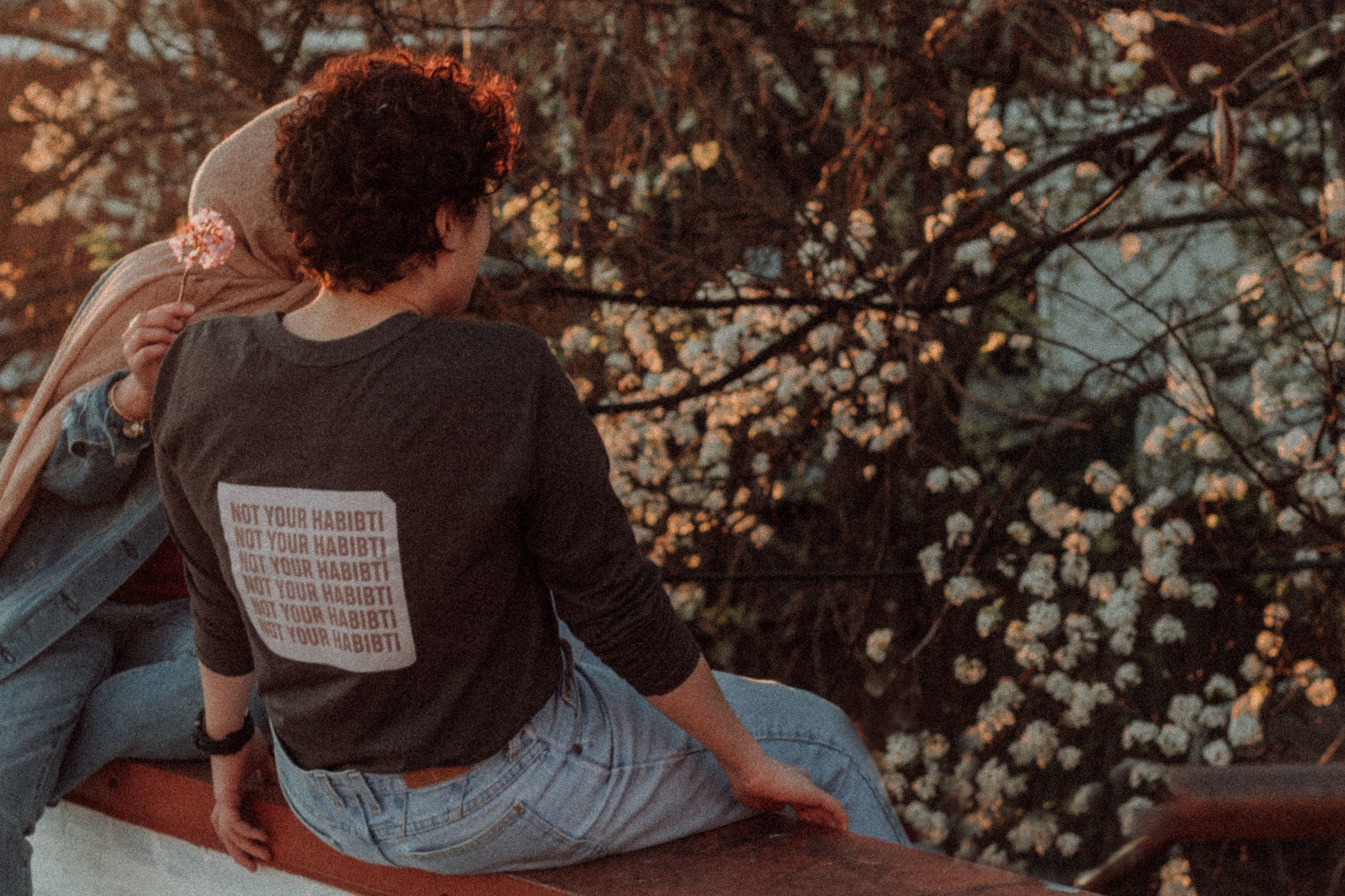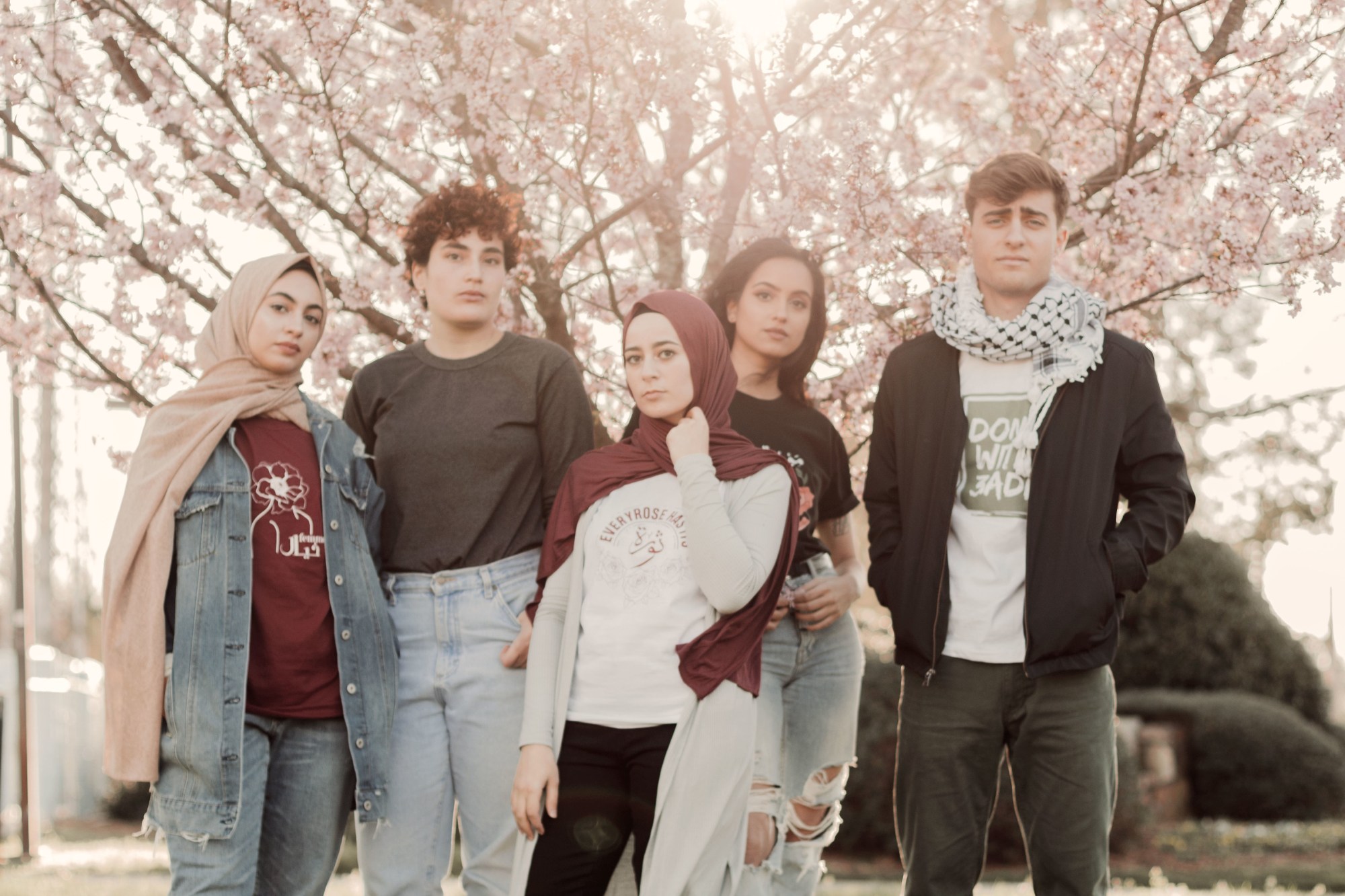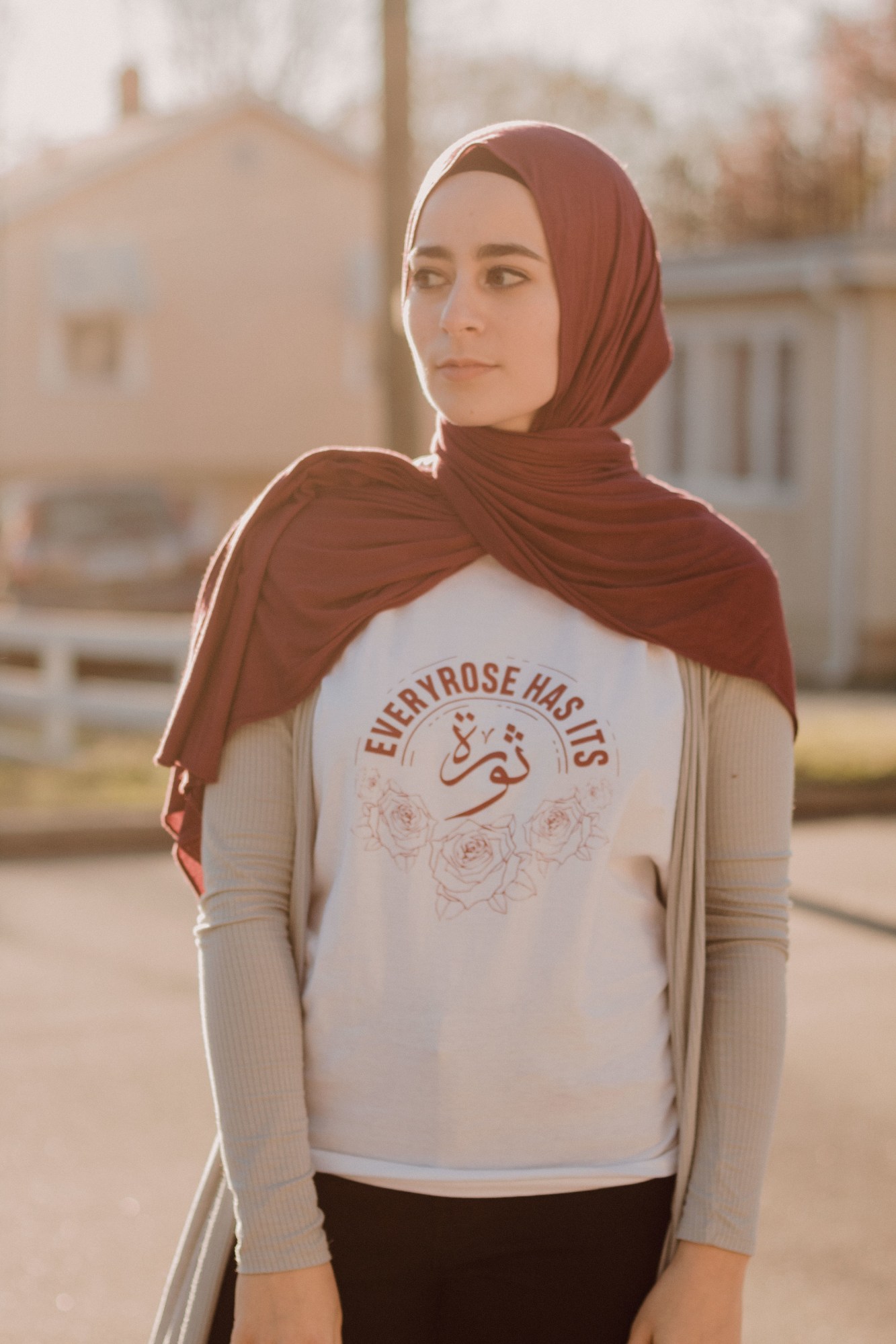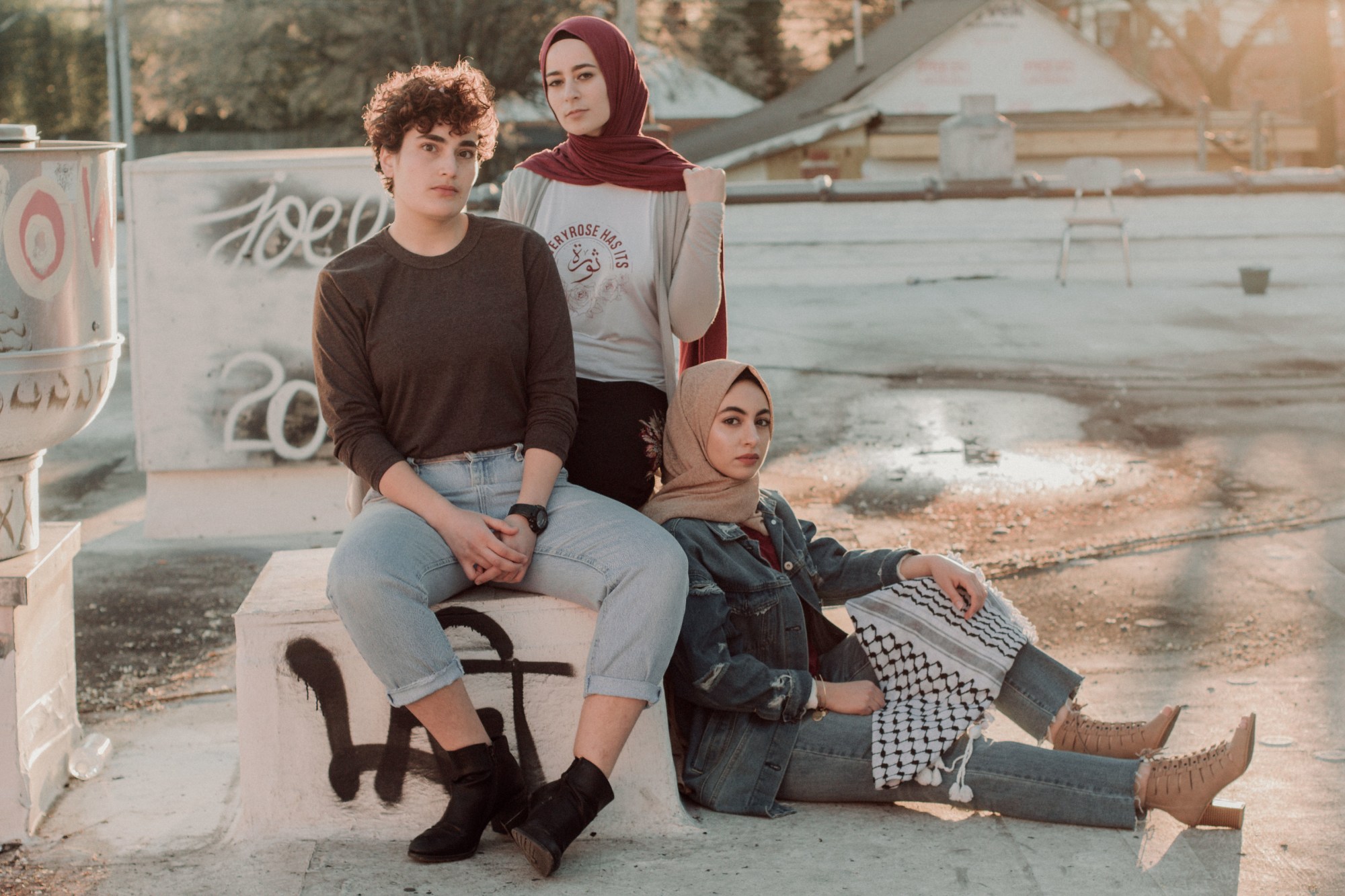Yasmeen Mjalli is a Palestinian-American women’s rights activist and social entrepreneur. If that’s too much to get your head around, Yasmeen is also the artist behind BabyFist Denim, a line of handcrafted denim jackets and t-shirts the 21-year-old created to lead the visual charge around her social movement, #NotYourHabibti. After moving from her hometown in North Carolina to her family homeland in Ramallah, the rampant street harassment Yasmeen suddenly experienced inspired her to create a community where Palestinian women and Arab women around the world could talk about the taboo topics influencing their daily lives.
Realizing her friendly Southerner personality wasn’t acceptable in Palestinian society, Yasmeen felt like she had to shut that part of herself down. “Friendliness was taken as a sexual advance, so I had to curb it,” Yasmeen tells i-D. “I hated who I was becoming.” So she decided to dive deeper into her own experience by inviting other women to share their stories of street harassment and sexual abuse. Through the Typewriter Project, Yasmeen is collecting women’s stories on the streets and online, all to be displayed as part of a multi-city art installation later this year.
Yasmeen says “it all started with a jacket.” When she first hand-painted “Not Your Habibti” on a denim jacket, global activism wasn’t on her mind yet. She had seen the phrase “Not Your Baby” across social media, but she wanted something that spoke more to her identity as an Arab woman and her struggle to reconcile her modern feminism with the stereotypes and constraints of gender roles in Arab society. BabyFist Denim was born, and with it an important philosophical conversation about what it means to be your own woman in the world today.

How do you think fashion and activism empower each other?
I think fashion is really powerful because of the way the world of social media is structured today. One of the quickest ways for a trend to spread is through fashion. When I started BabyFist, the issue that really catalyzed the entire movement was street harassment. And street harassment comes so much from what you’re wearing — or you think it’s what you’re wearing. You think maybe if you cover up or if you wear a certain color or a certain jean cut — whatever it is — that it will be a preventative tool against sexual harassment somehow.
For a lot of women, when you go out into the streets now, you’re not putting on clothes to express who you are. You’re dressing in a certain way so you can prevent or minimize sexual harassment. I think that was one of the biggest reasons I wanted to start making what I make. I wanted to make a piece of fashion that was simultaneously a statement that speaks about a larger movement that everyone could get behind, but was also expressive. You aren’t wearing [the pieces] because you want to cover up or you’re afraid. You want to wear them because you really identify with what they stand for.
Why was it important for you to keep BabyFist production local to Gaza and the West Bank?
I became interested in working in Gaza after I found out the Gazan textile industry is only about 1/13th of the size it used to be before the siege just over a decade ago. Now there are all these international efforts to revive the textile industry and to connect Gaza with the outside world. They have the resources and the capacity, they just don’t have the opportunities to create for anyone.
I reached out to an organization that connected me with some manufacturers who make the denim jackets in Gaza. The jackets are then brought to the West Bank, to Ramallah, and they’re hand-embroidered by a co-op of 25 women, mothers, and wives who dedicate three or four hours a day when the kids are at school and the husbands are at work to bring in some extra bread and butter for the family. Those 25 women are scattered in all of the villages just outside of Ramallah, the main city. The t-shirts are also made in Ramallah.

What role does the Israeli occupation play in Palestinian feminism and social activism?There’s this idea that Palestinian women are vehicles or vessels for tradition. We are symbolic of maintaining our tradition and our identity, which unfortunately is used as a way to shackle women to traditional gender roles. If we want to maintain our identity under occupation, it means maintaining what women mean to that identity. It means if we want to stay Palestinian and show the world that we still exist, women still have to be mothers, women still have to stay at home, women still have to embroider, and do all these things that are thought to be traditionally Palestinian in an effort to maintain a threatened culture. Which is totally misinformed, unjust, and counterproductive. If anything it makes for a stagnant culture that isn’t growing, that isn’t evolving. It’s crippling what used to be a really vibrant culture.
On top of that, our government and a lot of our citizens use occupation as an excuse not to attend to really severe social issues. So many women have come up to me when I’m on the streets and a lot of men have DMed me on Instagram, asking: ‘How can you be arguing for gender equality when we still have an occupation to fight? We have to deal with Occupation first, then when we’re free, we can deal with social issues.’ That’s just not fair, and it’s a patriarchal excuse to maintain power.
Occupation is the rug under which we brush all of our social and cultural issues. In 70 years of occupation, how many generations of women have come and gone dealing with gender-based oppression and discrimination? We can’t keep using occupation as an excuse to keep gender equality on the sidelines. I don’t want to be the generation that comes and goes under the same traditional gender-based oppression that my ancestors went under.
How do you feel your feminist identity and your Arab identity collide or overlap?
Arab culture has so many beautiful aspects to it — tradition, culture, language. Unfortunately, we’ve confused particular parts of our tradition with oppression. In an effort to distinguish ourselves from the international community, specifically the West, we’ve held on to this identity that is really female oppressive. How can I be an Arab and a feminist when it seems like they’re mutually exclusive? I know that Arab culture isn’t inherently oppressive. It’s just that we’ve made it that way by misinterpreting and misunderstanding who we really are.
A lot of my work revolves around arguing that you can be a feminist, Arab, and Palestinian all at the same time. My journey is to provide this space for women to come forward and start talking about wanting to be feminists but having a hard time because they are Arab or Muslim or Palestinian, and How can I be both? Is it possible? I want them to know that it’s totally possible, and it’s okay to feel the way you do, and there’s a community that will encourage you and celebrate you if you do decide to embrace both. Because they shouldn’t be exclusive.

